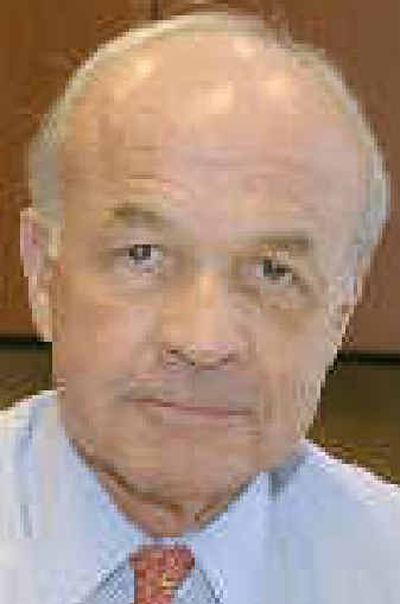Lay says he was clueless about Enron fraud when he took over

HOUSTON — Enron Corp. founder Kenneth Lay describes his return to CEO just months before the energy company’s collapse in terms that make him sound like he was a student cramming for a final after letting others do the coursework.
“Throughout that whole period, a lot of information was flowing to me from a lot of different sources,” he said.
Lay contends he was clueless about fraud at Enron when he retook the reins of the company in mid-August 2001, after the abrupt resignation of his protege, former CEO Jeffrey Skilling. He also says that even as he was being warned about questionable activities, he was working hard — and legally — attempting to straighten out the company’s financial problems.
Convincing a jury of that may prove to be crucial if he hopes to avoid a long prison term, since federal prosecutors are alleging that when the longtime Enron chairman regained the CEO’s title, he took the reins of a long-standing conspiracy to fool investors and regulators into believing the company was healthy.
Lay sat down with The Associated Press in his downtown Houston office this week to discuss the 11 counts of conspiracy, fraud and lying to banks against him and other topics — namely his relationship with President George W. Bush and his personal finances — as part of his uncommon public defense blitz to return the Justice Department’s punches. His attorney, Michael Ramsey, was not present.
The affable Lay, accompanied by his daughter, Elizabeth Vittor, and a spokeswoman, appeared relaxed. Even now, having last week become the 30th person charged in the government’s 2 1/2 -year investigation and Enron winding its way through bankruptcy, he remains a booster for the company that defines both his success and failure.
Lay said he tried and failed to save Enron, which rose to No. 7 on the Fortune 500 under his leadership, but he didn’t know crimes that sealed the company’s fate had been committed on his watch.
As he did at a news conference hours after his initial court appearance, Lay insisted he was duped by chief financial officer Andrew Fastow, the financial whiz he trusted to ensure its operations were legal.
After Skilling left, Lay said he met with division heads and representatives of various groups regarding organizational changes, personnel changes, strategic decisions, investments, regulators, legal issues, finance, operations “or whatever.”
He heard complaints, most notably from Sherron Watkins, the former Enron executive who warned Lay of impending doom less than four months before the company crashed. He also heard assurances that Enron could handle hundreds of millions of dollars in writeoffs for money-losing ventures in broadband and water as well as some of Fastow’s convoluted financing methods.
Fastow, Enron’s former finance chief, pleaded guilty in January to running schemes and partnerships to hide Enron debt and inflate company profits while funneling millions of dollars to himself. Fastow is the government’s most high-profile cooperating witness — and the object of Lay’s scorn.
“It looks like Fastow was the mastermind of all of it,” Lay said. “And again, he apparently did a pretty good job of selecting those he wanted involved in it. But we’re more likely to think there was bad activity going on very close to him than anywhere else in the company.”
Enron’s collapse led a series of corporate scandals that prompted Congress to pass sweeping reforms of securities laws. Thousands of Enron’s workers lost their jobs, and the stock fell from a high of $90 in August 2000 to just pennies, wiping out many workers’ retirement savings.
Lay wouldn’t comment on or criticize other former executives facing charges — including Skilling and former accounting chief Richard Causey — who have pleaded innocent to fraud, conspiracy and insider trading charges. Lay says they, like him, are innocent until proven guilty.
Lay remains free on a $500,000 bond while he awaits trial. He says his and his wife’s $400 million net worth has dwindled to less than $20 million, and most of that is earmarked for legal fees.